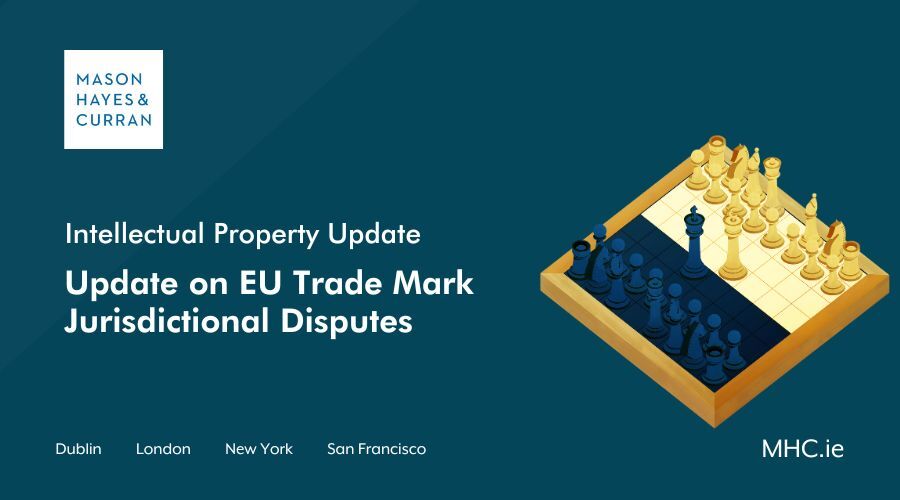
A recent decision sheds light on the Irish Courts approach to handling trade mark and passing off claims across EU Member States. The Irish High Court’s ruling highlights the need to prove “targeting” of a specific market. Our Intellectual Property team explores the decision which offers valuable lessons for global brands and online businesses alike.
EasyGroup Limited and EasyGroup IP Ireland Limited (EasyGroup) issued proceedings in the High Court against Easy Forex and its parent company. The case involved claims of trade mark infringement and passing off. These claims related to five of its EU trade marks containing the word “easy”.
EasyGroup argued that Easy Forex’s use of the word “Easy” in its provision of financial services infringes its trade mark rights. EasyGroup also claimed that Easy Forex passed itself off as part of EasyGroup’s easy family of brands. This family of brands includes well known names such as easyJet. EasyGroup also sought an injunction directing Easy Forex to change its name and to discontinue its use of the word “easy”.
EasyGroup said that it was entitled to bring proceedings for trade mark infringement within Ireland under Article 125(1) of the EU Trade Mark Regulation (EUTMR). It also claimed that it could bring proceedings for passing off under Article 7(2) of the Recast Brussels Regulation.
Targeting in trade mark infringement
Easy Forex disagreed that the Irish Courts had jurisdiction to deal with the allegations and sought an order confirming this position. Easy Forex’s main argument was based on the distribution of its user base. It stated that out of 11,255 world-wide users, only 16 are based in Ireland. According to Easy Forex, this is simply a result of its authorisation to operate throughout the EU. It argued that it does not actively target the Irish market. This is in contrast with other countries, such as Spain, where it sponsors Real Madrid football club.
The key issue for the Court was whether the sale of services to even a single individual in one Member State could establish jurisdiction. An important distinction was made between the sale of services and the sale of goods in this scenario. The question was whether a company domiciled in another Member State providing the service could be sued for trade mark infringement in the Member State where the service was sold.
The Court considered the relevant case law to address this issue. It found that case law clearly requires evidence of “targeting” consumers in the Member State concerned. In this instance, the focus was on whether Easy Forex specifically targeted consumers in Ireland. A website being accessible by consumers in a Member State does not mean that they have been targeted by the owner of the website. Web-based businesses could be sued in other countries if there wasn’t a rule requiring them to actively target consumers in those countries. The Court also disagreed with EasyGroup’s argument that it is not necessary to show targeting if there has already been a sale in Ireland.
Multifactorial test
The Court applied a multifactorial test to assess whether Easy Forex had been targeting the Irish market. It concluded that this was not“…a situation where, from ‘start to finish’, a consumer in their encounter with the easymarkets.com website is being targeted…”.
The website recognised a person’s IP address to display information in English. It also automatically provided the Irish telephone code and address options from a list of hundreds. However, the Court did not view these features as targeting the Irish market. Instead, it considered them a "necessary consequence" of the website being accessible worldwide and part of its software design. The Court found that this did not amount to "active conduct."
The Court also considered several other factors. One was that Ireland is listed as one of 30 or so countries in the website’s client agreement where services are provided. Another was the availability of the easyMarkets app from the Google Play Store or the Apple App Store in Ireland. However, the Court was not persuaded that these factors were evidence of targeting.
Passing Off
Regarding the passing off claim, the Court did not see that establishing a “close connection" to the Irish market as any different to the necessity for targeting in the context of trade mark infringement. The Court therefore ruled that it does not believe that Easy Forex can be sued in Ireland for the alleged trade mark infringement and passing off.
Conclusion
The Court’s decision to decline jurisdiction in this case provides an important reminder. Jurisdictional disputes can be at play when trying to enforce EUTMs outside of an alleged infringers home country. It also underscores the need to consider what constitutes an act of infringement. This is especially relevant for web-based businesses providing sales of service. The decision makes it clear that there needs to be some form of active conduct on the part of the alleged infringer to “target” the jurisdiction whether it be for trade mark infringement or in passing off. This decision will perhaps not be welcomed by more well-known, Europe wide, brands such as EasyGroup, who will need to show more concrete evidence of targeting. However, it will provide some security to more regional companies who should not be “…sued in a court of a Member State which he could not reasonably have foreseen.”
For more information and expert legal advice on how best to protect your intellectual property rights, please contact a member of our award-winning Intellectual Property team.
People also ask
What is a jurisdiction dispute? |
Jurisdiction in this instance refers to a court’s power to decide a case or issue a decree. The underlying rationale is that a court should be able to try and adjudicate only those matters with which it has some connection. This connection could relate to the territorial or financial limits of its authority. This may be disputed where it can be argued that another court has a stronger connection to the matter at hand. |
What is trade mark infringement? |
Trade mark infringement occurs when a registered trade mark or a similar sign is used without authorisation. This unauthorised use must take place in the course of trade and relate to goods and/or services. It is considered infringement if the use is likely to cause public confusion. This includes situations where there is a likelihood of the sign being associated with the trade mark. |
What is passing off? |
Passing off is a legal claim under common law which can be used to enforce unregistered trade mark rights. It helps protects the goodwill of a trader from misrepresentation. |
The content of this article is provided for information purposes only and does not constitute legal or other advice.
Share this:




